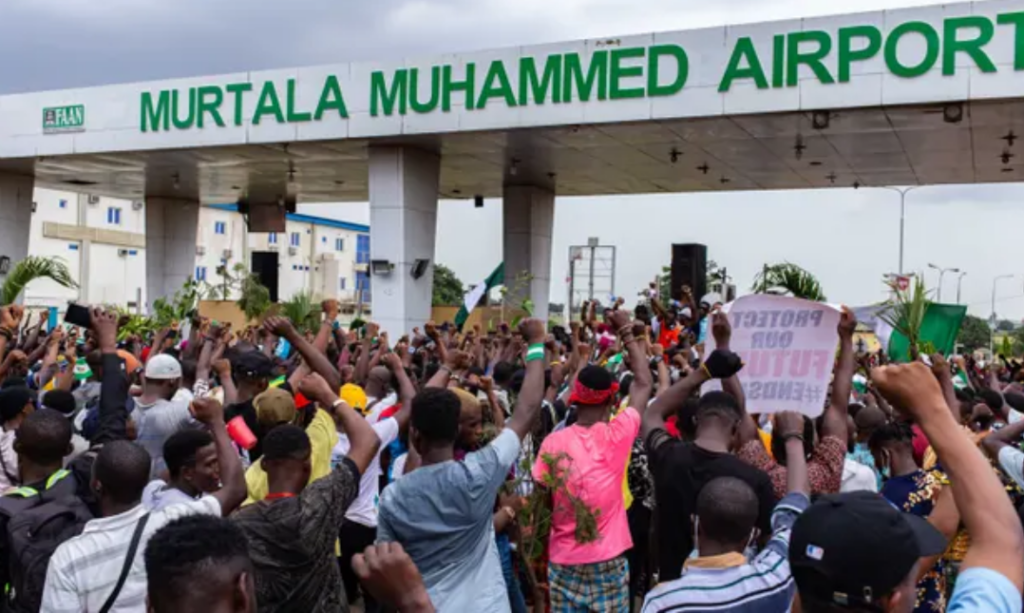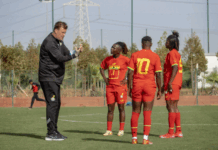Nigerian security forces have opened fire on hundreds of protesters in Lagos, as rallies against police brutality continued in defiance of a 24-hour curfew imposed by the government earlier in the day.
Graphic scenes posted on social media showed protesters fleeing as security forces, including soldiers, shot live rounds towards the crowds.
At least seven people were killed according to DJ Switch, a popular disc jockey, who broadcast live from the scene on Instagram.
Protesters were seen struggling to remove shrapnel from injured protesters and in one case failing to resuscitate a casualty.
In other videos protesters carrying bloodied Nigerian flags are seen pleading with security officials to allow medics to treat victims.
“They started firing ammunition toward the crowd. They were firing into the crowd,” Alfred Ononugbo, 55, a security officer told Reuters. “I saw the bullet hit one or two persons.”
Lagos state government said it would open an investigation into the shooting, which witnesses said took place around 7pm.

Fears had grown of increased unrest after a curfew was imposed by Lagos’s governor, Babajide Sanwo-Olu, earlier in the day in an attempt to shut down protests against the notorious Special Anti-Robbery Squad (Sars) police unit that have erupted across Nigeria.
Thousands have taken to the streets in recent weeks against the federal Sars unit, now dissolved but long accused of extra-judicial killings, torture and extortion.
More broadly the demonstrations have railed against systemic abuse by Nigerian police forces, but they have in turn been met by violence.
Last week, the Nigerian army warned it was ready to step in against “subversive elements and troublemakers”, while police have repeatedly fired on protesters across Nigeria. Armed gangs have attacked protesters in Lagos and the capital Abuja.
The demonstrations had “degenerated into a monster threatening the wellbeing of our society”, said Babajide Sanwo-Olu, the governor of Lagos, in a statement on Tuesday after a police station was set on fire in the Iganmu area of Lagos on Tuesday morning.
The national police chief also ordered the immediate deployment of anti-riot forces following increased attacks on police facilities, a police spokesman said.
“Criminals and miscreants are now hiding under the umbrella of these protests to unleash mayhem on our state,” he said, promising that the government would “not watch and allow anarchy”.
Groups of armed people, often impoverished young men, are widely suspected of being paid by powerful interests in Nigeria. Rights groups and protesters have accused “thugs and sponsored hoodlums” of attacking the peaceful demonstrations and seeking to discredit the movement.
Five Nigerian states and the capital, Abuja, have banned protests or adopted curfews, effectively banning demonstrations.
Several protesters yesterday targeted Lagos airport, blocking off entrances to its international and domestic terminals, causing flight delays.

Outrage at police abuses reached a tipping point after footage posted online in early October showed Sars officers dragging a man from a hotel in Lagos before shooting him in the street.
Thousands of mainly young people have demonstrated, many for the first time, demanding immediate police reforms. Protests groups have raised more than £200,000, setting up helplines for protesters in trouble, covering medical aid and providing private security.
In response to widespread demonstrations, which are not common in Nigeria, the government has dissolved the unit and adopted numerous measures, including judicial panels to investigate Sars abuses and compensation for victims.
Yet protests have grown, amid criticism that the pledges do not go far enough, following several previous pledges to reform or overhaul the unit.
Many are incensed that Sars officers have not been arrested despite a deluge of video evidence showing abuses, including, in recent weeks, at demonstrations. The Lagos government has however said it will investigate all reported abuses and that four officers arrested for killing a man in Surulere, when firing at protesters were now under trial.
The announcement of the new police unit, the Special Weapons and Tactics (Swat) team, to partly replace Sars, has caused anger too.
In recent days, people wielding machetes, knives and clubs have attacked protesters, leaving many injured according to Amnesty International.
At least 15 people have died since protests began two weeks ago, Amnesty said, condemning widespread violence by police forces against peaceful demonstrations.
“In the past few days we have documented escalating violence and coordinated attacks against peaceful #EndSars protesters,” Amnesty International Nigeria said in a statement yesterday, adding police had used “excessive force” leading to many casualties.
Footage posted online showed dozens of young men with machetes, knives and sticks arriving at the scene of a protest sit-in outside the Lagos state government secretariat last Thursday, then attacking fleeing protesters.
Witnesses accused security forces of standing idly by. Lagos’ government condemned the violence and ordered an investigation.
In Benin City, in the southern state of Edo, nearly 2,000 inmates broke out of two prisons after crowds attacked. Footage on social media showed several prisoners fleeing and climbing out from above the prison walls, joining groups of men in the city vandalising property.
Edo’s governor, Godwin Obaseki, ordered a 24-hour curfew, blaming vandalism “by hoodlums in the guise of #EndSARS protesters”.
In Obalende, a busy market area in Lagos, people put up road blocks with tyres and rocks and extorted cash from drivers, as protests took place nearby, mirroring similar reports of unrest across the city.
The government announced the scrapping of the Sars unit and a raft of reforms over a week ago in a bid to placate the protesters. But many of the young demonstrators are sceptical of government promises without clearly specified timeframes and are fearful that Sars officers are being adopted into the police force without any accountability.






